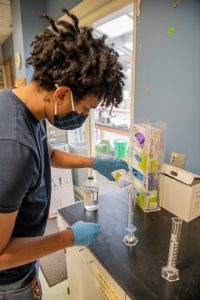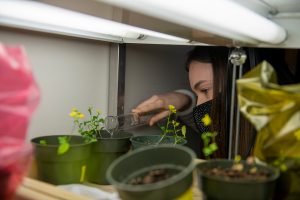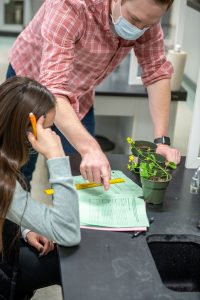Topics:
Biology
The Biology Department offers a variety of courses including General Biology, Anatomy & Physiology, Zoology, Microbiology, and Genetics. There are courses set up specifically for programs such as the Mayo Health-Related Programs, Biology Transfer Pathway, and Environmental Science Program. Most Biology courses include both lecture and lab experience for the best hands-on training. A list of courses with catalog descriptions follows.
 The instructors in the Biology Department are enthusiastic and ready to teach the students principles and procedures using state-of-the-art equipment and technology. They have a wide range of credentials and are able to share how the students’ education will be necessary in their future careers.
The instructors in the Biology Department are enthusiastic and ready to teach the students principles and procedures using state-of-the-art equipment and technology. They have a wide range of credentials and are able to share how the students’ education will be necessary in their future careers.
Through completion of their academic path in Biology, students will develop the ability to:
- Explain the scientific method and demonstrate the ability to apply all aspects of it during the scientific investigation.
- Demonstrate an ability to understand and apply biological concepts and processes.
- Show proper use of instruments and techniques in the laboratory.
- Demonstrate an ability to work independently and collaboratively.
- Exhibit responsible behavior and engagement as a student in biology.
Biology Course Offerings (Click on the Course Title for an Outline of Topics)
BIOL 1100 Environmental Biology
This is a one-semester course that introduces students to applied aspects of environmental science. It provides students with a broad overview of the concepts of ecology, systems and interrelationships among organisms and their physical environment, and current issues in environmental science. Students will examine humans’ role in the natural world and the impact of the growth of the human population and the increase in humans’ technological ability to make changes in the world. Students will be encouraged to explore societal, political, economic, and personal value systems will regard to environmental issues. More information
BIOL 1101 Elements of Biology
A one-semester course for non-science majors that blends traditional and contemporary biological concepts for understanding life in today’s world. Science and the scientific method, the nature of life, cell structure and function, cell reproduction, genetic inheritance, human genetic analysis, biotechnology, and evolution are covered. Students will evaluate ethical issues of some biological, genetic, and biotechnology applications. This course will serve as an introduction to cellular biology to prepare for further study in biology-related or health-related fields. Lab attendance is mandatory. More information
BIOL 1102 Plant Biology
This course covers the fundamentals of plant biology, focusing on the various types of plants and the basic anatomy and physiology of plants. The course is also designed to promote an awareness of the significance of plants in the natural processes of our biosphere and specifically for humans. Students will be challenged to think about the importance of plants in decision-making, from the individual, ethical choices to social, economic, and policymaking choices. More information
BIOL 1107 Fundamentals of Anatomy & Physiology
This one-semester course provides a comprehensive overview of introductory human anatomy and physiology of the major body systems. The course introduces students to biological molecules, cells, tissues, and organ systems of the human body and incorporates medical terminology. The laboratory curriculum does not include the physical dissection of organisms. More information
BIOL 1110 Human Biology
This course is a one-semester study of the biology of the human body. Each of the component systems will be studied in order to develop an understanding of how each part contributes to the whole. This knowledge will be applied to the analysis of current health and social issues. Laboratory sessions are designed to correlate with lecture topics. Dissection of appropriate animal specimens is included. More information
BIOL 1200 Introduction to the Clinical/Research Laboratory
This course is for students currently employed in or ultimately seeking employment in a clinical or research laboratory with a health care focus. This course is specifically designed for students in the Biotechnology and Laboratory Science programs at RCTC. The goal of this course is to familiarize the student with key confidentially, documentation and safety issues encountered when working with patient samples in a clinical or research laboratory. More information
BIOL 1211 Principles of Nutrition
This course covers the science of foods and their structures and functions within the human body, to provide knowledge and awareness of human nutritional requirements and processes. Specific focus will target biological requirements needed in the human body to provide energy and structural materials and to regulate the growth, maintenance, and repair of the body’s tissues throughout the stages of the human lifestyle. The course will enable students to develop foundational knowledge to establish and make informed nutritional choices and understand the role of nutrition in personal, societal, and global issues. More information
BIOL 1215 Anatomy and Physiology of the Cardiovascular and Lymphatic Systems 
This course covers the anatomy and physiology of cardiovascular and lymphatic systems. College-level reading and writing skills and working knowledge of elementary algebra. More information
BIOL 1216 Anatomy and Physiology of the Nervous & Respiratory Systems
This course will cover in detail the anatomy and physiology of the nervous & respiratory systems. More information
BIOL 1217 Anatomy & Physiology I
This course is part one of the two-semester Anatomy and Physiology sequence. This course focuses on cell structure and function, tissues, chemistry as it relates to biological function, metabolism, and major organ systems including the integumentary system, muscular and skeletal systems, cardiovascular system, and blood and lymphatic and immune systems. More information
BIOL 1218 Anatomy & Physiology II
This course is the second part of the two-semester Anatomy and Physiology sequence. This course covers the nervous, respiratory, digestive, urinary, endocrine, and reproductive systems. Metabolism and fluid, acid/base, and electrolyte balance are also discussed. College-level reading and writing skills are necessary. More information
BIOL 1220 General Biology I
This course is one of two introductory courses in biology. It is a cellular-based approach to the foundational principles of biology, and it addresses basic life processes at molecular, cellular, tissue, and organismal levels, principles of evolution, and interactions among organisms. More information
BIOL 1230 General Biology II
This course is one of two introductory biology courses. It is an organism-based study of the diversity of living organisms including the structure and function of organisms to incorporate how they carry out basic life processes (e.g., gas exchange, nutrition). Students study comparative anatomy and physiology and the evolutionary history and relationships among organisms, addressing key adaptations to the survival of selected organisms. More information
BIOL 1300 Biological Applications of GIS Technology
This course will teach the use and application of Geographic Information Systems (GIS), computerized systems designed for the storage, retrieval, and analysis of geographically referenced data. Applications of GIS Technology will include using analytical tools to explore at a scientific level the spatial relationships, patterns, and processes of organisms in relation to environmental, biological, demographic, geographic, and physical phenomena. The course will be computer-intensive and project-based. More information
BIOL 1310 Environmental Science Seminar
This course will provide an understanding of and exposure to environmental science fields, networking, resume building, career exploration, and internship opportunities, as well as aid in students’ ability to apply scientific principles to various environmental science issues. It will introduce students to important research papers in the field of environmental science and ecology. These experiences are aimed to help prepare students for a future in-field experience, job, and/or further education. More information
BIOL 2000 Ecology
This course teaches the basic principles of organismal, population, community, and ecosystem ecology, with an emphasis on applied ecology. The course is designed so that at the conclusion of the course students will have an appreciation and understanding of the principles of ecology and be able to: (1) explain the various biotic and abiotic forces acting on an organism in its natural environment, (2) determine the importance of these forces under varying conditions, and (3) predict how human activities may alter the effects of these forces. The lab portion of this course reemphasizes lecture concepts and offers hands-on experience with the concepts in the lab and/or field setting. More information
BIOL 2020 Fundamentals of Biotechnology
This is a semester-long, lab-intensive course for students currently employed in or ultimately seeking employment in a clinical or research laboratory with a health care focus. This course is specifically designed for students in Biotechnology programs at RCTC. The goal of this course is to provide the student with both a conceptual and practical understanding of basic lab techniques with particular emphasis on developing the skills to perform these specific techniques independently upon completion of the course. More information
BIOL 2021 General Microbiology
This is an introductory microbiology course covering the following topics: prokaryotic cell structure, metabolism, growth, genetics, pathogenesis; viruses; the eukaryotic microbes, fungi, and protozoa; epidemiology, control of microbial growth, specific and nonspecific immunity, and immune disorders. Students must show completion of prerequisite courses with a C or better. More information
BIOL 2200 General Zoology
This course is a survey course on the classification, evolution, ecology, anatomy, and physiology of animals. The lab portion of this course reemphasizes lecture concepts and offers hands-on experience with representative members of organisms studied in the lecture. More information
BIOL 2300 Genetics
This course presents the fundamental concepts of classical transmission genetics and modern molecular genetics. Topics include Mendelian genetics, linkage and mapping, chromosomal anomalies, population and evolutionary genetics, biotechnology, and nucleic acid analysis. More information
